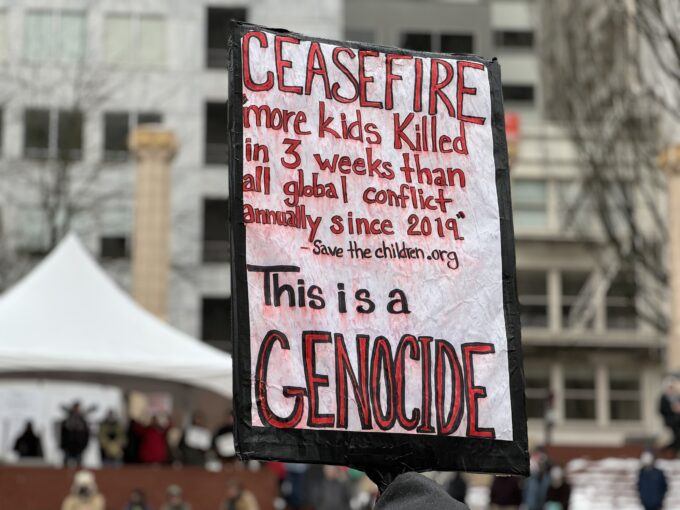Germany Buries the Evidence of Complicity in Genocide: Nicaragua Exposes It

Photograph by Nathaniel St. Clair
Last Thursday, Dr Ghassan Abu-Sittah, the British-Palestinian war surgeon, gave his first address as the newly-appointed rector of Glasgow University, chosen in recognition of his work at al-Shifa hospital in Gaza. The following day he flew to Berlin, where he had been invited to address a major conference about Palestine. On arrival he was taken away by police, interrogated for several hours and eventually told he had to leave Germany and wouldn’t be allowed to return until at least the end of April. Any attempt to speak to the conference via Zoom could result in a fine or even a year’s prison sentence. By the time he was released he couldn’t have taken part in the conference anyway, since it had been already invaded by at least 900 police and closed down. Berlin’s mayor said that it was ‘intolerable’ that the conference was taking place at all.
Speaking about his experience afterwards, Dr Abu-Sittah referred to the fact that Germany had – also last week – been defending itself at the International Court of Justice against charges by Nicaragua that it is an accomplice to genocidal war. ‘This is exactly what accomplices to a crime do’ he said. ‘They bury the evidence and they silence or harass or intimidate the witnesses’.
Watching the live feed of Germany’s lawyers at the Hague a few days earlier had been an odd experience. They gave the impression of being affronted that Germany had been accused of such crimes, especially by a small country which, they argued, had no stake in the case. Also, Israel could not yet be said to be committing genocide, because the ICJ has not yet determined the case brought against it by South Africa, which Germany had supported Israel in contesting. Because Israel was not party to the new case, it should simply be thrown out.
Some research might have given them a better appreciation of Nicaragua’s credentials to bring the case. Its mutual solidarity with Palestine goes back a long way. It also has more experience at the Hague than Germany, including its pioneer action against the US in 1984, when it won compensation of £17 billion (that was never paid) for the damage done to Nicaragua by the US-funded Contra war and the mining of its ports. Carlos Argüello, who led the case last week and many of its previous cases, said that Nicaragua offered its expertise to Palestine and it had already joined in with South Africa’s action. It had decided to target Germany, the second biggest supplier of arms to Israel, because the US, the biggest supplier, is outside the court’s jurisdiction on this issue.
Argüello explains that the object is to create a precedent with wider application – that countries must take responsibility for the consequences of their arms sales to avoid them being used in breach of international law. Germany’s argument that legal action cannot proceed before South Africa’s earlier case is resolved is nonsense, since countries have an obligation to prevent genocide, not merely wait until it is proven to be happening. In any case, Germany must have been aware of the numerous warnings from senior UN officials of the imminence of genocide in Gaza, which began as early as October 9th.
Germany claimed that it has a “robust legal framework” in place to ensure its arms exports are not misused, and that sales to Israel are now restricted to non-lethal equipment. But any supplies being sent to a genocidal army are helping to sustain its criminal actions, Nicaragua replied.
Much was made of Germany’s historic obligations due to its Nazi history, but Argüello argues that these should relate to the Jewish people, not the Israeli state. He adds that Germany’s past might also oblige it to help prevent genocide wherever it might occur. Its government spokesman on the South Africa case had claimed that Germany is ‘particularly committed to the Genocide Convention’.
The economist Yanis Varoufakis was also banned from speaking in Berlin. He planned to conclude his speech by telling German politicians that ‘they have covered themselves in shame’ through their unflinching support for Israel’s atrocities. Carlos Argüello echoes this point when asked whether a decision by the ICJ can actually be enforced: we have to mobilise shame, he says, ‘…that’s the hope with this. Perhaps being too idealistic, but it’s the only weapon we have’.
Germany confirms its collaboration with genocide
 The photo is a screen shot from Press TV showing a demo protest against the shutdown of the conference.
The photo is a screen shot from Press TV showing a demo protest against the shutdown of the conference.
A three day Palestine conference in Berlin was forcibly shut down after three hours on Friday. Electricity was abruptly terminated in the midst of the presentation by Salman Abu Sitta, the 87 year old author of the authoritative “Atlas of Palestine”.
Former Greek Finance Minister and leader of DIEM25, Yanis Varoufakis, was prevented from entering Germany to attend the conference. He went on Twitter/X to send a message:
Do you know that the German Interior Ministry has just banned me from entering Germany? Indeed if that were not enough, I have been banned from talking to you via zoom, or indeed through a video message like this, exactly like this. The threat being that I will be tried in Germany for breaking German law. Why? Because of a speech that I published yesterday on my blog calling for universal human rights in Israel- Palestine …. So my question to my German friends, to Germans in general whether you agree with me or not doesn’t matter. … Is this (banning) in your name? Is it something that you feel comfortable happening in your democracy? From my perspective this is essentially the death knell of the prospects of democracy in the Federal Republic of Germany.
Another banned guest speaker was UK citizen Dr. Ghassan Abu Sittah. He reported on Twitter/X:
I have just returned from Germany where I was prevented from entering the country for attending a conference in Germany to give evidence on the war in Gaza and my witness statement as a doctor working in its hospitals. This morning at 10 I landed in Berlin to attend a conference on Palestine where I had been asked … to give my evidence of the 43 days that I had seen in the hospitals in Gaza, working in both Shifa and al-Ahli Hospital. Upon arrival I was stopped at the passport office. I was then escorted down to the basement of the airport where I was questioned for around 3.5 hours. At the end of 3.5 hours I was told that I will not be allowed to enter German soil and that this ban will last the whole of April. Not just that … if I were to try to link up by Zoom or Facetime with the conference even if I were outside Germany or if I were to send a video of my lecture to the conference in Berlin, then that would constitute a breach of German law and that I would endanger myself to have a fine or even up to a year in prison.
Dr. Abu Sitta further commented:
Germany is defending itself against Nicaraguan charges that it is an accomplice to genocidal war as described by the International Court of Justice. This is exactly what accomplices to a crime do. They bury the evidence and they silence or harass or intimidate the witnesses. …. This crackdown on free speech is a dangerous precedent… We are watching the first genocide unfold in the 21st Century and for Germany to become implicated as an accomplice in silencing the witnesses of this genocide does not bode well for the rest of the century.
A large contingent of police invaded the conference and shut off the electricity. Organizers told the reported 250 conference attendees to not provoke the police to violence. Afterward, organizers held a press conference reporting on the behaviour of police before and during the crackdown. Even before the conference, police tried to intimidate supporters of the conference and the owner of the conference venue. They threatened the venue owner might not be able to hold events in future if the conference went ahead. An organizer asked, “Are these the methods of the mafia or democracy?”
Western and Israeli media reported the closure was to prevent “anti semitism” or “hatred of Israel”. On this dubious and hypothetical basis, public education about a real ongoing massacre and mass starvation was made illegal.

